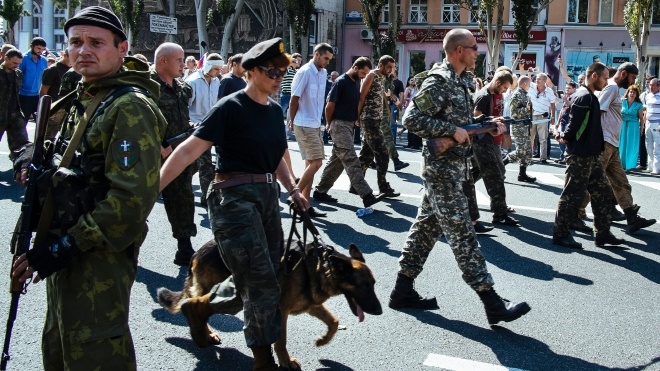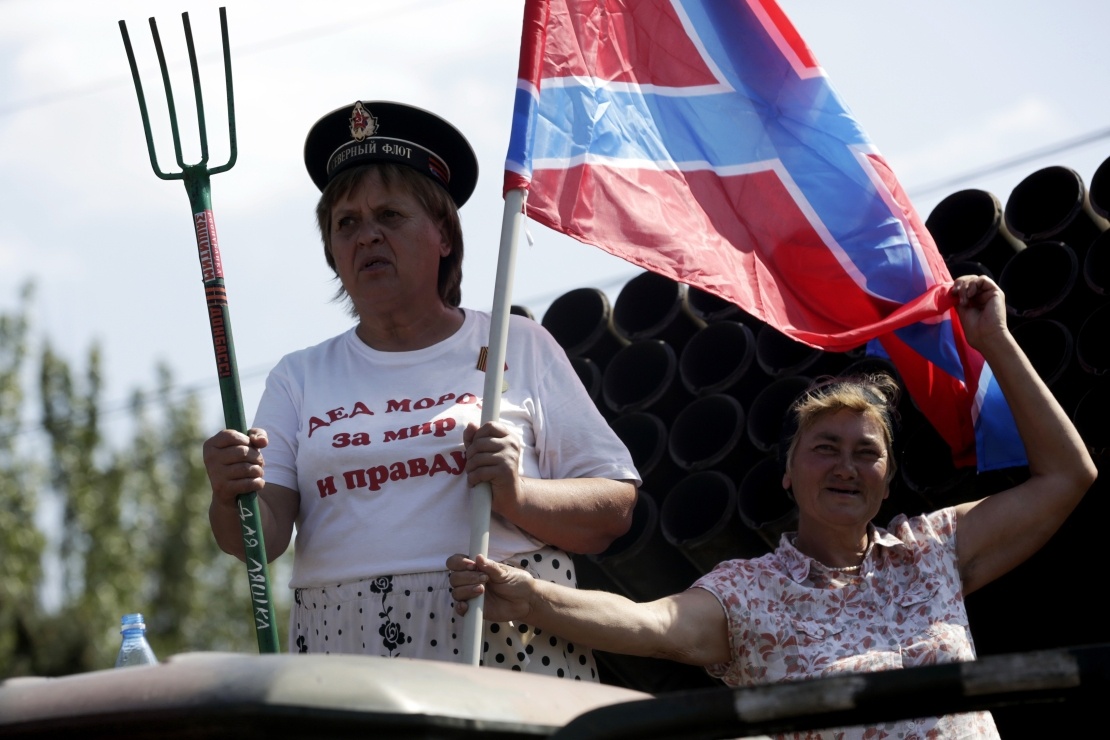Vasyl Stasiev was in captivity from August 13 to December 26, 2014
On the night of August 12-13, 2014, we left the village of Stepanivka in Donetsk Oblast after active enemyʼs shelling. The advantage was on the enemyʼs side. While leaving, our convoy ran into their checkpoint. The first car in convoy was destroyed, our car was also shelled, and everyone was taken prisoner.
Of course, there was no preparation for that "parade" [in occupied Donetsk on August 24], no rehearsing marches. For us, it was a bit unexpected. During one of the interrogations, one of the Russians said that they wanted to do [this], as in 1944, they were saying, "you are fascists, Nazis", but none of it was taken seriously at the time. To be honest, it was unbelievable.
And when we were taken out [for a parade] on August 24, the idea that this was probably it gradually began to settle. An hour before the beginning of that "event," we were lined up, and some clumsy military leader began to talk in front of us. He said that now we will go to the so-called "parade", where everyone will look at us, and so on.
The only thing I remember from that "parade" is the beastly crowd. I donʼt know. Maybe they deliberately picked up such radical individuals. But the feeling was that they were ready just to attack us and tear us apart. They were constantly throwing something at us, stones, tomatoes, etc.
A couple of times, they broke through the ranks of these "guards" surrounding us on all sides, and we got a couple of kicks. I canʼt imagine what would have happened if they had completely broken through this "protection". We probably wouldnʼt have survived.
In my opinion, this [parade] is a remnant of a gray, dense past that is still present in Russian Army, its government, and all their [Russian] policies. Only terrorists and some illegal armed groups can do that. After all, prisoners of war fall under the Geneva Conventions — their rights must be protected, and they must be kept in decent conditions. In no case can there be any "parades" with them.
A woman rides on a truckʼs body with a pitchfork and the flag of "Novorossiya" during the "parade of prisoners". Donetsk, August 24, 2014.
Such excessive cruelty is a sign of helplessness and weakness. To force people to march this way, to brand them with shame, is, in fact, means to impose the same brand on oneself, on the whole country. As a result of excessive cruelty, a person who is not confident in himself and his actions tries to humiliate and insult another person as much as possible, thus asserting himself. I think this can be extrapolated to the whole Russian nation. But they probably donʼt understand that.
If Russia organizes such a "parade" again, it will be disgraced in front of the whole world, it will fall even lower [in their eyes] if such a thing is possible. I hope that this will not happen after all. I pray that all our girls and boys return from captivity as soon as possible.
Victor Filatov, analyst of the NGO “Human Rights Group "SICH"
From a legal point of view, holding such "parades" violates all possible norms of national and international law — the European Convention on Human Rights, the Geneva Conventions, and the Rome Statute. These are war crimes with no statute of limitations and are subject to criminal liability.
Coercion to participate in the so-called "parade" is already a manifestation of inhuman treatment that degrades human honor and dignity. Prisoners of war have the right to be adequately treated. They cannot be humiliated for defending their land. This is psychological violence, which can be viewed as torture. It is also possible to speak with confidence about the use of physical violence, threats, intimidation, blackmail, and imitation of executions [against prisoners of war]. Ukraine experienced all this in 2014, except that now the scale of war crimes is hundreds of times greater.
Yulia Polekhina, lawyer of the "SICH" Human Rights Group
Since the "parade of prisoners" violates the Geneva Conventions, anyone involved in such a crime will be punished. Acts contrary to the conventions are viewed as violations of international humanitarian law and as war crimes in particularly severe cases. The latter fall under the jurisdiction of the International Criminal Court.
In 1954, the Soviet Union ratified the Geneva Conventions. After the collapse of the Soviet Union, Russia declared itself its successor, so it recognized itself as a party to international treaties signed by the Soviet Union. Criminal liability may arise not only for the commission of a war crime but also for an attempt to commit it, as well as for aiding, abetting, or inciting such a crime. Criminal liability also arises for plans to incite a war crime.
War crimes and crimes against humanity provide individual and collective responsibility, for example, the commanderʼs responsibility for the crimes of his subordinates. Today, there are several mechanisms according to which Russia and its leadership can be internationally prosecuted for war crimes and aggression. In particular, these are international judicial institutions and international military tribunals:
- Ad hoc military tribunals are set up to prosecute those responsible for severe violations of international humanitarian law. Examples from history are the Nuremberg, Tokyo, and Yugoslav tribunals. Foreign Minister Dmytro Kuleba supported the initiative to establish such a tribunal to hear the case of the Russian aggressorʼs crimes against Ukraine. A draft of the Declaration and statement calling for establishing a tribunal have already been prepared. The establishment of the Tribunal will add to the ongoing processes in the International Criminal Court, the International Court of Justice, and the European Court of Human Rights.
- The International Criminal Court is the first permanent body of international criminal justice. An investigation into international crimes in Ukraine has already begun. The application to start it was submitted by 42 countries, which is the largest number in the history of the ISS. The ISS prosecutor Karim Khan personally initiated an investigation into the Russian invasion of Ukraine.
Russian armed militants parade dozens of captured Ukrainian soldiers during a march meant to mock the celebration of Ukraineʼs Independence Day. Donetsk, August 24, 2014.
Translated from Ukrainian by Yana Sobetska.
Support Babel:🔸donate in hryvnia 🔸in cryptocurrency 🔸via PayPal: [email protected].


